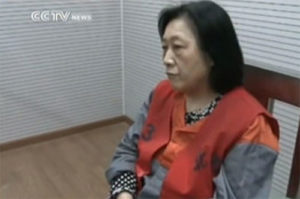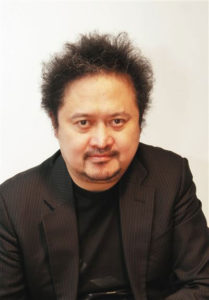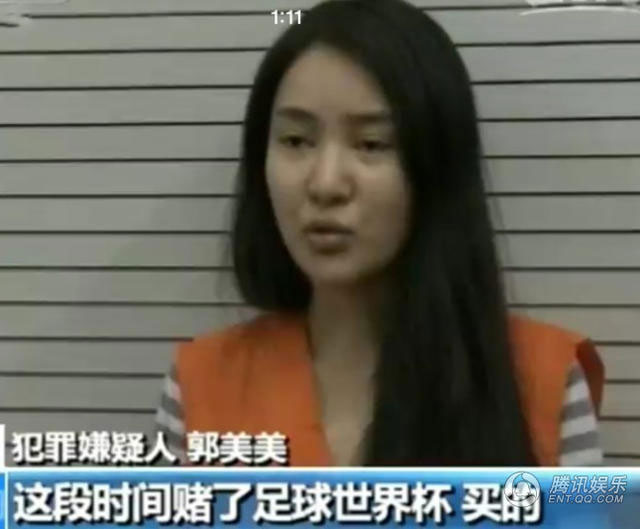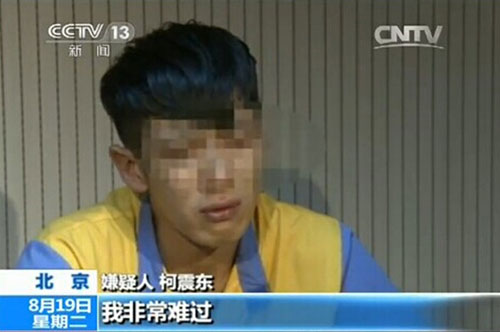Since 15 July 2013, CCTV has aired a number of confessions made by people accused but not yet convicted of a wide variety of crimes. Many appeared in orange prison uniforms (either waistcoats or jumpsuits), with others in yellow and green.
Liang Hong, 15 July 2013
Vice-President of Operations in China for pharmaceutical giant GlaxoSmithKline (GSK), Liang Hong 梁鸿, appeared on the primetime CCTV News 新闻联播 to confess that GSK had used bribes to expand its business in China. In September 2014, the Changsha City Intermediate People’s Court (Hunan province) fined GSK three billion yuan, the highest penalty given to a foreign company to date. Liang and other senior GSK executives received sentences of two to four years for bribing non-government personnel.
Peter Humphrey and Yu Yingzeng, 27 August 2013
GSK employed Peter Humphrey, a Shanghai-based British private investigator, and his Chinese-born American wife Yu Yingzeng 虞英曾 to identify the whistle-blower who had reported its alleged corrupt practices to the authorities (see Liang Hong). Humphrey and Yu confessed on CCTV to having illegally bought and sold private information on Chinese citizens.
Charles Xue, 29 August 2013
On 12 August 2013, the chief of the State Internet Information Office, Lu Wei, attended a dinner with influential microbloggers or ‘Big Vs’, where he reminded them of their ‘responsibilities’ to society. One of the Big Vs present was Charles Xue 薛必群 (aka Xue Manzi 薛蛮子), a frequent critic of government policies. The following week, police arrested Xue for soliciting prostitutes. On 29 August, CCTV aired a video of Xue confessing to group sex (a crime in China) and an addiction to prostitutes (see the China Story Yearbook 2013: Civilising China, Information Window ‘The Struggle Against Rumours’, p.432).
On 15 September, CCTV aired a second confession from Xue in which he said that his influence on Weibo made him feel ‘like an emperor’, that he had abused his power, and passed on unverified information as fact. In April 2014, before the authorities laid charges, Xue was released on bail because of a medical condition.
Dong Rubin, 17 October 2013
Dong Rubin 董如彬 shot to fame in 2009 when he blogged about the death of an inmate in a Yunnan jail. The police claimed the inmate had died playing a game of hide and seek 躲猫猫, a term which then became an Internet meme. In his October TV appearance, Dong confessed to exaggerating information for the benefit of clients of his Internet promotion business.
Chen Yongzhou, 26 October 2013
Chen Yongzhou 陈永州, a journalist, appeared on CCTV News to confess that he had been bribed to run fabricated stories about a business in Changsha, Hunan province. Fellow journalists had expressed outrage immediately after his arrest, but many went quiet after hearing Chen’s confession.
Tang Xianbing and Liu Han, 21 February 2014
In 2013, Liu Han 刘汉, a mining and real estate tycoon in Sichuan province, was arrested with thirty-five other suspected gang members for murder, blackmail and other crimes. Some media reports linked him to the fallen former Chongqing Party Secretary Bo Xilai. On 21 February 2014, CCTV aired a tape showing Tang Xianbing 唐先兵, a security guard with Liu’s company, confessing to multiple murders on Liu’s orders. Liu and Tang have both been handed the death sentence.
Qin Zhihui, 1 April 2014
Qin Zhihui 秦志晖 (aka Qin Huohuo 秦火火), an Internet publicity agent, appeared on CCTV News confessing to spreading rumours and fabricating stories online. He was sentenced to three years in jail on 11 April.
Xiang Nanfu, 3 May 2014
Xiang Nanfu, a freelance contributor to the US-based Chinese news website Boxun who had written on such topics as organ-harvesting and police brutality, appeared on CCTV News and confessed to writing false stories that damaged China’s image.

Gao Yu, a seventy-year-old journalist, was arrested on 24 April 2014 and accused of providing an internal party document to an overseas website
Photo: blogs.wsj.com
Gao Yu, 7 May 2014
Gao Yu 高瑜, a seventy-year-old journalist, was arrested on 24 April 2014 and accused of providing an internal Party document to an overseas website (see the China Story Yearbook 2013: Civilising China, Forum ‘Party Policies from One to Ten’, p.114). In May, CCTV broadcast blurred footage of a ‘Ms Gao’, a figure in orange prison clothing, expressing remorse for her actions.
Zhang Lidong, 31 May 2014
On 28 May, members of the Church of Almighty God religious cult beat a woman to death in a McDonald’s restaurant in Shandong province. In his televised confession, the main culprit, Zhang Lidong, said they wanted to convert the victim, but she refused to give them her phone number (see Forum ‘Almighty God: Murder in a McDonald’s’, p.304).
Mirzat, 21 June 2014
A man identified as Mirzat 木尔扎提 confessed to being one of three Uyghur men who had entered a mahjong parlour in Hotan city in Xinjiang and attacked patrons with axes. Mirzat said the leader of the gang had convinced him that he would go to paradise if he participated in jihad. He apologised and promised never again to involve himself in terrorist activities.

Independent film director Zhang Yuan confessed to using drugs, following a positive urine test.
Photo: media.people.com.cn
Zhang Yuan, 27 June 2014
Film director Zhang Yuan 张元 confessed to using drugs following a positive urine test earlier that month. Zhang had form, having previously appeared on CCTV in a 2008 drug bust.
Guo Meimei, 3 August 2014
Guo Meimei 郭美美 became notorious in 2011 for flaunting her luxurious lifestyle while claiming to work for the Chinese Red Cross (see the China Story Yearbook 2012: Red Rising, Red Eclipse’, Chapter 8 ‘Voices from the Blogosphere I’, p.204). She remained an Internet celebrity, frequently showing off inexplicable riches. Her CCTV appearance was the first time she had been seen without her glamorous props: sans makeup and wearing an orange prison vest. She confessed to lying about her connection to the Red Cross as well as to organising illegal gambling and charging for sexual services.
Ko Chen-tung and Jaycee Chan, 18 August 2014
On 18 August, Beijing media reported that Jaycee Chan (aka Fang Zuming 房祖名), the actor and son of the Hong Kong movie star Jackie Chan, had been arrested in Beijing on drug-related charges together with Taiwanese actor Ko Chen-tung (‘Kai Ko’) 柯震东. That night, Ko appeared on CCTV crying and apologising to his fans for his misbehaviour. Copies of the yellow and blue vest Ko wore quickly became a trending item on the online commerce site Taobao.




